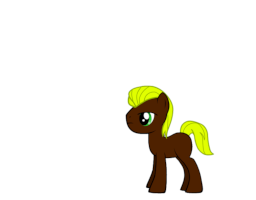
A new pony arrives in the Everfree forest, and he moves into Ponyville, with Applejack. He has several secrets that he carries. Will the two find true love? Or will his past prevent it?
Hey! I'm getting this story revitalized and editing it! Special thanks to VunderGuy for his big help in this endeavor to perform necromancy and edit this old thing! Never would have gotten around to it without him. Hope you guys enjoy all the work we put into this! Especially the work Vunder has done! Be sure to give him some love, as he deserves every bit of it he gets.

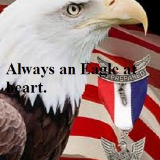

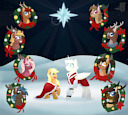
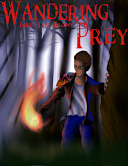

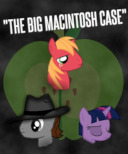
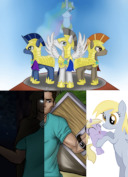
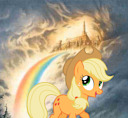
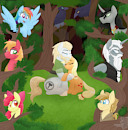




Let me just stop you right there for using one of the worst cliches this fandom has. No better way to have your main character be all mysterious and exotic than have them come from the nearby Location of Doom, and the fandom is sick of it. It's up there with 'Twilight messing up a spell causes X, Y and Z to happen', that's how common it is. Having him be from a different town or city is a much more valid and plausible backstory.
25.media.tumblr.com/tumblr_macuyhfxur1revv8uo1_400.gif
Oh boy, like THAT'S not so overdone it borders on yawn-inducing. You don't outright state that, you hint that something's not right about him through the course of the story.
Oh, and having your cover image be from GeneralZoi's Pony Creator is NOT doing you any favours. At all. It's seen as a mark of absolute laziness. And the colours don't even go together all that well.
3860926 Well, I would like to thank you for your input. Even if it could have been put a nicer way. I will try to take that into consideration for future stories I do.
3862032
I didn't mean to come across as so harsh, it's just I've seen too many fics that tend to rely so heavily on cliches you don't even need to read them to guess where things are gonna go. The fact that you can at least spell words correctly did give me hope that you would see reason.
3862043 Well, I always listen to what anyone says. It is the only way to truly become better at anything.
3862077
Yay! A sensible newbie! We don't see enough of folks like you.
3862088 In all honesty, I've actually written stories on another site. This is just my first one here.
3862104
You're a newbie here.
3862120 Very true.
Mysterious OC comes out of nowhere and will end up falling in love with one of the mane six...
i.imgur.com/147Ci1g.gif
OK, so I've read the other comments here, and I'm gonna do you a solid, CD. I'll give you a condensed lesson on writing. Let's look at your opening paragraph.
OK, we look at it and what exactly does this paragraph tell us? It says a lot of things, going through many events, moving the plot along. That's all well and good.
However, it ignores some of the most important rules of writing.
1. You need to hook your readers from the very first sentence. This is the most difficult thing to do in writing. Like an exciting race starts with a sharply-shouted "GO!", you have to entice your readers from the very first line. Let's look at your opening sentence:
Hm... that's... well... it's happening, yeah... but it isn't interesting. It isn't eye-catching. You're just stating it matter-of-factly, like you're reading from an instruction booklet.
This is where you can get really creative. One good way of hooking your readers in from the first sentence is to have a character make a statement. That implies the action is already happening, the wheels are already spinning, the pen is already pushing against the paper, and the story is ALREADY happening. So why don't we move the last sentence of this paragraph to the first sentence instead?
And your readers will look at this first sentence and ask, "What does WHAT say?" It will make them somewhat curious about what's going to happen. It will keep them interested. And that's what you want.
Leading us to point 2.
2. When establishing the scene, be sure to frame it in ways that appeal to the reader's senses. You breeze through the scene without really setting it up. This is a big no-no when trying to suck your readers into the world you're presenting to them. When you're going over your scenes, be sure to ask yourself questions like:
"Is it warm or cold here right now? And if either, HOW and IN WHAT WAY is it warm/cold?"
"What can I smell from here? If we're near Sugarcube Corner, we could probably smell sweets being baked..."
"What can I hear? The distant murmur of ponies going about their businesses? The chirping of birds in conversations?"
"What's going on in this scene? What kind of emotions, character interactions, or situation can I build in this scene?"
You see what I'm doing with those questions? These are ways you can pull your reader in: by tapping into their senses. What does the reader get to see from here? Smell from here? Feel from here? You might need to appeal to every sense, every time, but it helps to cover as many at once as possible.
In short, be sure to write these scenes as if you've been there yourself.
The fourth question, though, is the most serious. If your first sentence is to hook a reader, then the following paragraph ought to build into it. It ought to deepen the mystery behind the opening sentence. It ought to hook them even further.
So let's take all those elements I just described and re-write the paragraph a little more.
3. Show, don't tell. When you blazed through the paragraph, you didn't establish anything without saying, basically, that it happened. Telling the reader it's a nice day outside doesn't pull them into that nice day. It does not prove to your readers it is a nice day. Instead, simply showing the readers WHY it's a nice day outside will spark their interest.
Think of it this way. If you can't give us proof, then it ain't the truth.
That leads us to point four.
4. Writing devices are your tools. To describe something, you need something you can compare it to. From here, you can use stuff like metaphors....
...hyperbole...
...anthropomorphism...
..or if you're feeling cheeky, some alliteration or puns.
In short, writing devices are tools. They are to you what a hammer and nails are to carpenters. They are to you how jackhammers and cranes are to construction workers. They help you build the very world you're trying to present your readers with. So use them!
5. Know when to separate your paragraphs. Finally, this is where I sensed many issues with this paragraph. I can't tell where one idea or action begins and where another ends.
A paragraph should encompass only ONE idea or action. Then, when the action shifts, it becomes another paragraph. Paragraphs are meant to steer the story into a certain direction little by little -- only rarely all at once (Thanks to a handy-dandy trope called "The Wham Line").
So if you were to have Twilight open the story with her question, that single sentence would be its own paragraph. Single-sentence paragraphs should be used sparingly, as they help emphasize the sentence itself.
After Twilight asks her question, we "pan out" a bit, and the mystery deepens as Spike opens the letter.
And after THAT paragraph, Spike and Twilight read it.
And after THAT paragraph... and after THAT paragraph...
See where I'm going?
And that concludes this condensed lesson. If you've read it this far, I hope it helps you become a stronger author.
3862962 Thanks a lot. Well, I'm going to edit this chapter tomorrow and try to make the other chapters the same way. Again, thank you.
don't take hard i thought did take two stories down because of grammar because the commented only on the grammar and not the story itself keep at it
3864909 I know I can always improve and I love constructive criticism. Constructive criticism is the only way to improve. I also enjoy those that just enjoy the story.
3864929 I like your story. Why does it have down votes?
can i just know if this is Steve jobs pony or not cause i feel like it is Steve jobs pony